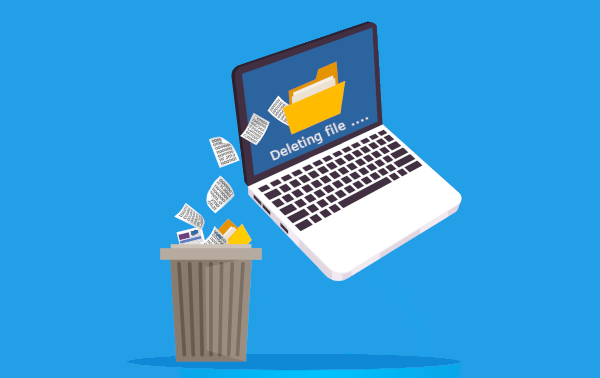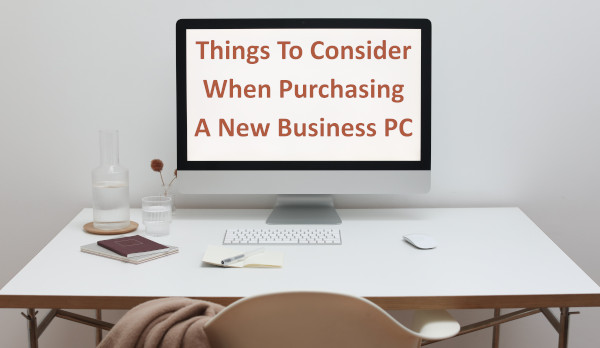Do you wonder what happens when you delete a file from your computer? You probably hit the delete button to send it to the Recycle Bin, then empty the bin and think it is gone forever. But is it really? Read on to find out what is happening behind the scenes. Continue reading
Tag Archives: hard drive
Things To Consider When Purchasing A New Business PC
Have you ever bought something and then had buyer’s remorse a few months later? The same can happen when purchasing anew computer for your business. Continue reading
How to Destroy Your Digital Data
 When we accidentally delete something, it feels like the end of the world. If a client file or your latest proposal is deleted, you may have to start again. Yet deleting files may not as permanent as many think. When it comes to destroying data properly, you will need to take a more thorough approach. Continue reading
When we accidentally delete something, it feels like the end of the world. If a client file or your latest proposal is deleted, you may have to start again. Yet deleting files may not as permanent as many think. When it comes to destroying data properly, you will need to take a more thorough approach. Continue reading
Data Backup Nightmares: Data Loss Horror Stories that Can Happen to You
According to a survey from Forrester, only 20% of companies are prepared for a data loss incident. This is very alarming, especially considering the fact that data loss has become 400% more frequent since 2012. Continue reading
What is the Best Way to Backup Your Data?
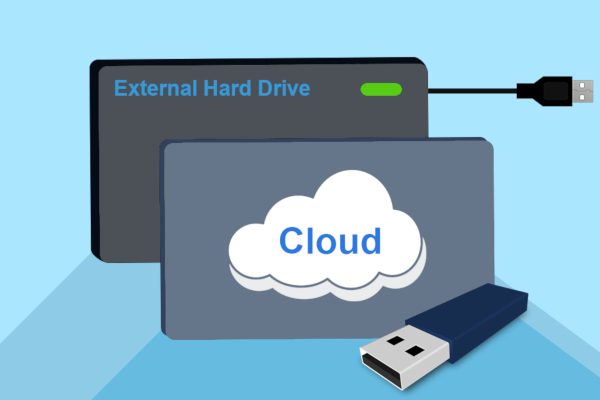
There are numerous ways to backup, each with their own advantages and disadvantages. In this article we talk about the best ways to backup your data. Continue reading
Hard Disk Drives – Why Do They Fail and What Can You Do About It
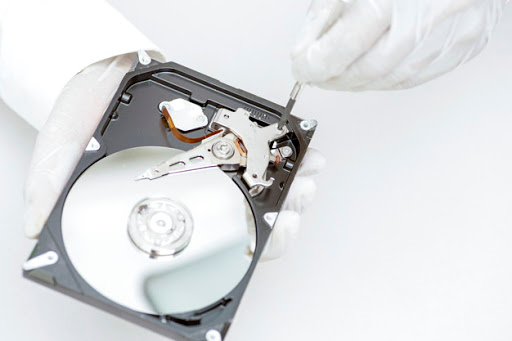 Whether it’s your computer’s internal unit or an external device, hard disk drives allow us to store electronic information. Also known as an HDD, you can store tens of thousands of files on each of these devices, so they can work as the archive of your business. Like other electronic devices, hard disk drives can fail and send any company into a small panic. There are many reasons these devices malfunction and there are several steps you can take to prevent it from happening. And, in case it’s too late, you may still be able to restore your information. Continue reading
Whether it’s your computer’s internal unit or an external device, hard disk drives allow us to store electronic information. Also known as an HDD, you can store tens of thousands of files on each of these devices, so they can work as the archive of your business. Like other electronic devices, hard disk drives can fail and send any company into a small panic. There are many reasons these devices malfunction and there are several steps you can take to prevent it from happening. And, in case it’s too late, you may still be able to restore your information. Continue reading
Revive Your Slow Computer with an Superfast SSD

Old age creeps up slowly on most of us. Unless you’re a computer – then it seems to happen overnight!
One day you are using the computer fine, the next day it is so slow and booting takes so long you not only have time to make a cup of coffee, you could have walked to the local café for the good stuff!
This is when most people throw their hands in the air and start wishing for a new computer. Except your computer isn’t broken, it is just….slow. Time-wasting, focus-losing, frustratingly slow. Like most machines, computers have parts that slow things down and eventually wear out (especially when they are in near-constant use).
The hard drive is the #1 cause of speed issues in most computers. Traditional hard drives are made up of round magnetic platters, spinning at up to 7200rpms, while a head on a mechanical arm whizzes back and forth reading and writing data. Eventually, the platters take longer to spin up, unable to reach full throttle and the mechanical arm becomes sluggish. Which leaves you waiting and waiting…
SSD’s Can Give Aging Computers A New Lease on Life.
If you haven’t heard of SSD’s previously then you should get excited as the new era of hard drives are here with Solid State Drives – and they have no moving parts.
They are actually a lot like your USB stick that continually takes a beating but still performs perfectly.
Making a simple upgrade from an old hard drive (HDD) to a SSD can significantly reduce boot time and improve application loading. They are also:
- Cool – With no moving parts they are much, much cooler than traditional hard drives.
- More durable – No moving parts to wear out
- Compact – A little larger and thicker than a credit card
- Lightning fast – Data is accessed nearly instantly.
- Suitable for all systems– laptops and desktops
Upgrading your tired hard drive to a super-fast SSD can be done within one day. For only $AU320, we will supply and install a 240GB SSD for you, as well as clone your existing hard drive to it (Windows, programs and data). A full 12 month parts and labour warranty is included.
This is a limited time offer so don’t delay, book your SSD upgrade in today (someone else can make the coffee tomorrow!).
Call us on 08 8326 4364 to book in your upgrade.
All Hard Drives Eventually Fail

It is only a matter of time before all hard drives fail. Yes some may last longer than others but as they are mechanical with spinning parts and they will fail eventually. What things should you look for that point to a failing hard drive?
You can start by watching for these signs:
Your Computer Slowing Down
As hard drives contain moving parts, the slower they get, the slower your computer gets. It is like a record player, with spinning plates and a needle whipping from side to side. Your hard drive may eventually take longer to spin up and longer to retrieve files – this will have an impact on everything you do from booting your computer to starting your applications.
Not Booting
During the initial boot up stage, your computer consistently reading from your hard drive. If your computer can’t see the hard drive or has issues reading files then Windows won’t boot.
Corrupted Files
Sometimes a file won’t open because the computer says it is corrupted. Some essential pieces of the file are missing, and unlike a book where a missing page is only inconvenient, it is a deal breaker for computers.
Noises
You should make yourself familiar with the normal noises your computer normally makes as when the hard drive starts to fail these noises can change. You might hear clicking, grinding or even a sci-fi phaser noise. Noises may get louder or speed up during heavy file access.
The Blue Screen Of Death
This is when your computer locks up and only shows a blue screen with an error code. While a blue screen may indicate any number of things it can also point to a failing drive. The more often your computer does this, the more severe the problem is.
Whenever something is clearly wrong, the key is to stop and turn your computer off. Continued use can result in more data loss. Even if you don’t have a backup yet, turn it off now because the large task of backing up can cause extra strain on an already delicate hard drive. It’s tempting to hurry and try to get a quick copy of your files, but in these cases it is best to seek immediate help from a professional.
Also remember to regularly backup all your important data. Sometimes you will get the tell tale signs of a failing drive as listed above and other times you may not get any warnings.
If you hard drive is failing or has failed bring it to us and we will do all we can to retrieve your data. Contact us on 08 8326 4364 or su*****@dp*********.au as soon as you can.
Should I Buy a New Computer or Upgrade?
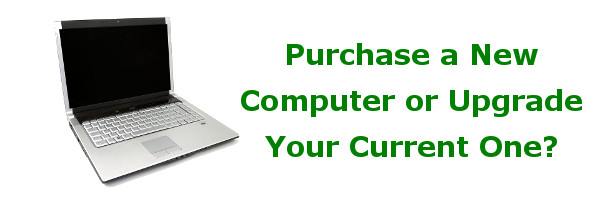 The age old question as to whether you upgrade or purchase a new computer and the answer usually depends on who you are actually asking! A store salesman will always recommend a new one and that geeky friend will probably say upgrade. Your best bet though is to talk with an experienced consultant or technician who should provide a few different options.
The age old question as to whether you upgrade or purchase a new computer and the answer usually depends on who you are actually asking! A store salesman will always recommend a new one and that geeky friend will probably say upgrade. Your best bet though is to talk with an experienced consultant or technician who should provide a few different options.
Start by looking at what you currently have and seeing if an upgrade is technically possible. For example, if your car is 30 years old and always having problems it is time to replace the rust-bucket! However, if your car is reasonably modern and in good shape but just happens to stall occasionally a quick trip to the mechanics will probably save you a lot of money over buying a new car. It is the same with a computer.
If your computer does need to be replaced, chances are you already know this. But if you’re not sure and some days it could go either way, these tips will help you decide.
Laptop / Desktop: What type of computer do you have? Generally desktops are much easier to upgrade over a laptop. Some laptops due to their small size can’t be easily upgraded so you may not have a choice.
Hard drive upgrade: New SSD’s (Solid State Drives) are super quick when compared to the traditional HDD’s (hard disk drives) and I highly recommend them on all computers to give them a significant speed boost. The main issue with SSD’s drives are they generally hold less information that a HDD but that is becoming less and less of an issue as prices drop.
Memory / RAM upgrade: Some cheap computers are underpowered from day 1 with most of them needing a memory boost. But depending on your usage even a great machine bought a few years ago could benefit from extra memory. Generally adding extra memory is a fairly straight forward task so speak with your IT consultant to see if it is worth adding some extra memory in your machine.
Video card upgrade: As time rolls on games and high end graphics applications are getting more and more demanding. The days of stick-figure animations are gone and lifelike 3D is the new normal. With that improved experience comes a huge strain on your computer’s graphic resources. If you are a gamer or need high end applications for your business you can often super-power your computer with a single component – a new video card. Speak with your IT tech to see if a graphics card will give your current system a nice speed boost or whether a new system is required.
Data / Applications Transfer: A lot of people overlook this and purchase a new computer thinking it will be a cheaper way forward. What they forget is that their old applications may not run on a new computer, that they need all their old data transferred and things like email and printers need to be setup and installed. When upgrading your current system you don’t have to worry about this.
Computer Service: Sometimes your hardware may all be fine and your computer just needs a service and cleanout. As time goes by old files and settings get left behind which slowly start to slow the computer down. Dust and dirt also get clogged in vents and fans causing the computer to overheat and slowdown.
Where to draw the line: There are other upgrades such as the CPU (the brains of the computer) and the motherboard (where all the parts plug into) but once you’re in that territory, it is really time to go for a full replacement – you will save money by getting a computer that meets your needs and can grow with you.
Is your computer letting you down? Give us a call at 08 8326 4364 or on su*****@dp*********.au to help you with upgrading or selecting a new computer

